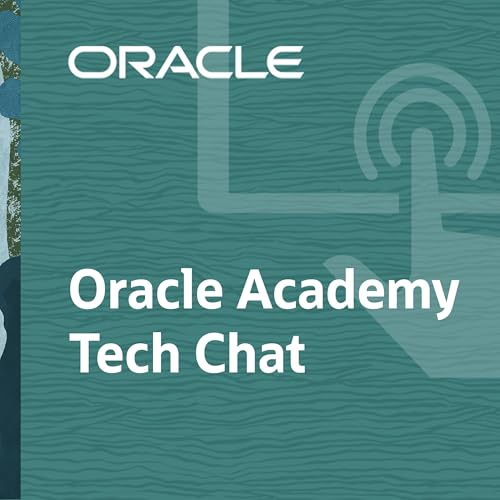In this episode, we'll talk about Security and Control with Exadata We'll explore how organizations can benefit from cloud innovation while keeping full control over their data — a critical challenge in today's digital world. ---------------------------------------------------- Episode Transcript: 00:00:00:00 - 00:00:44:19 Unknown Welcome to the Oracle Academy Tech Chat. This podcast provides educators and students in-depth discussions with thought leaders around computer science, cloud technologies, and software design to help students on their journey to becoming industry ready technology leaders of the future. Let's get started. Welcome to Oracle Academy Tech Chat, where we discuss how Oracle Academy prepares next generation workforce. I'm your host, Alba Joven, and today I am joined by Sylvia Adrdilo an Exadata Cloud customer Service Specialist at Oracle. 00:00:44:21 - 00:01:11:21 Unknown In this episode we will talk about bringing the cloud to you. Security and control with Exadata. We will explore how organizations can benefit from cloud innovation while keeping full control over the data. A critical challenge is to date digital work. So let's get started. To start off, Sylvia, I would love you to share a bit about your background and your current role at Oracle. 00:01:11:22 - 00:01:47:10 Unknown Absolutely. And first of all, thank you so much for having me here. It's, it's absolutely a pleasure. So my journey started with my graduated as a telecommunications engineer from the University of Malaga in Spain in 2014, and after I finish my studies, I jumped straight into the IT world. And it's been over ten years now. So early on I worked on several companies like IBM and U next and Indra, and during those years I mainly worked as a backend developer in several technologies. 00:01:47:12 - 00:02:16:08 Unknown And I have to say that it was a great foundation because you really get to understand how systems talk to each other behind the scenes, which later became super valuable. And after that, I moved into a more operational role. I was a support lead for UCS as Smart Metering Implementation Program, or MIP in Accenture, and as me was at the time, and still is actually a massive national project to modernize how energy usage is tracked across the country. 00:02:16:10 - 00:02:45:03 Unknown And in that role, I supported everything from from manufacturing the smart meters to getting them delivered to warehouses, activating their SIM cards, installing them in homes, and even managing the returns under the activation processes. It was it was a lot about ensuring that that such a massive operation run smoothly, run securely. I was solving incidents quickly, but but also you had to make sure that they were solved correctly. 00:02:45:05 - 00:03:08:21 Unknown So that millions of people were affected. And that really taught me how critical operation, security and resilience are when you're dealing with important data, national infrastructure. And then in in 2021, I joined Oracle as a cloud systems solution engineer. And in that role I started working much closer with customers. I was involved in the pre-sales side of the deals. 00:03:08:23 - 00:03:36:19 Unknown I was doing technical presentations, workshops. I was learning about all kinds of different Oracle technologies. Oracle's hardware portfolio, and also about data center setups and and the needs from different industries. And then last year, in 2024, I moved to my current role as an Excel Data Cloud customer specialist. And in this role I continue supporting our sales team from from a technical standpoint, during the pre-sales process. 00:03:36:22 - 00:04:06:21 Unknown But now I'm more focused or solely focused on Exadata Cloud customer. So basically I help customers and I help internal teams understand what Exadata Cloud Customer is, how it fits into their IT strategy, and especially how it can meet their security and operational needs. So I deliver workshops, I answer technical questions, I join customer meetings, create documentation, and also help train our internal teams so that everyone stays sharp on the technology. 00:04:06:23 - 00:04:32:18 Unknown So to summarize, my my whole career has been about understanding technology deeply and then helping people use it safely and effectively. So now let's talk about a crucial topic that is data security. Can you explain what data security is and why it's so important in today's world? Think of data security like the lock and the alarm system of your home. 00:04:32:20 - 00:05:10:17 Unknown So you keep your doors locked. Maybe you have cameras, sensors, alarms, whatever. All because what's inside your house is valuable and personal. Now, in the digital world, your data, whether it's research papers, personal information or medical records, business transactions and so on is just as valuable, if not more. So data security is the set of practices and technologies that we use to protect that digital...
Más
Menos
 25 m
25 m Feb 10 202627 m
Feb 10 202627 m 14 m
14 m 27 m
27 m 25 m
25 m Jan 14 202622 m
Jan 14 202622 m 16 m
16 m 13 m
13 m
